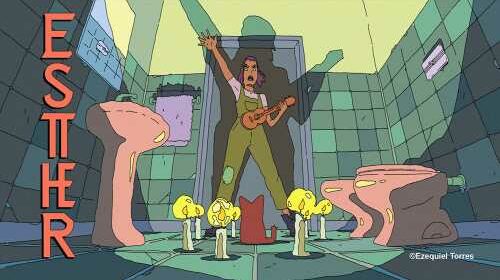‘Esther,’ ‘The Impossible Future,’ ‘My Dad, The Truck’ Head to Annecy’s La Liga Showcase

Tender father-daughter tale “My Dad, The Truck,” raucous coming-of-age series “Esther” and poignant docu-series “The Impossible Future” are among the projects venturing to Annecy’s Mifa Market for pitch sessions Wednesday as part of the Ibero-American Animation League’s annual forum.
Simultaneously, La Liga will also launch Ibermedia Next to foster the development of innovative animated co-productions between Iberoamerican countries and Italy, Portugal and Spain, organized in tandem with IBERMEDIA and Premios Quirino.
“This edition of Annecy holds immense significance for Latin America, with Mexico at the forefront as the country of honor,” Animation! head Silvina Cornillon told Variety. “Our dedicated Focus program perfectly captures the essence of Ibero-American animation’s dynamic and multifaceted creative spirit, reflecting its vibrancy and diversity in full measure.”
A spirited collaboration between Argentina’s Animation! Ventana Sur, Premios Quirino de la Animación Iberoamericana of Tenerife and Mexico’s Pixelatl Festival, the event aims to further bolster promising filmmakers.
“Through this session, our aim is to foster meaningful collaborations and encourage a greater number of co-productions. Furthermore, we aim to provide a nurturing platform where emerging talents can showcase their unique voices and contribute to the industry’s growth,” Cornillon said.
This year’s Latin American slate includes two features, three series and a short film with themes ranging from the mystical to the heartfelt and points in between. Some directors, informed by their heritage, others inspired to document simmering social movements.
Titles were selected from winning feature and short film and series projects presented at the 2022 Animation! Pitching Sessions in Buenos Aires, the Animation! Mentoring Program for Female Creators and the Shortway/Pixelatl Bootcamp.
A further breakdown of the titles:
“Kale’s Museum of Spookiness” (Lena Franzz, Brazil)
In this series, utilizing Harmony Toon Boom and 2D Cutout, two siblings with contrasting personalities grapple to understand one another, simultaneously battling ominous apparitions. Produced by Studio Chifrezz, it’s a “project that was born from mixing our three passions: 2D Animation, Comedy and Spooky Stories,” Franzz says.

“Chocó and the Magic Jungle” (Estefanía Piñeres Duque, Colombia)
The 2D feature follows 13-year-old Chocó as she confronts the monster that devored her brother, a journey that proves the creature isn’t as first perceived. It is “a story about empathy that aims to celebrate diversity, inspired by cultural traditions of the Colombian Pacific,” says Piñeres.
“My Dad, The Truck” (María Cristina Pérez, Colombia)
Pérez’s first feature follows a father’s journey to his true calling after a stubborn and calamity-filled move to the big city with his daughter. Using mixed media with digital traditional 2D it’s “a project with a visual proposal inspired by painting and artisanal aesthetics,” Pérez shares.

“Unfolding Myself” (Natalia Pájaro, Mexico)
Blending oil painting with traditional animation, this short-format film tracks Henrietta’s psychotic break. A young woman in crisis cruising through three days without sleep, she sinks into a deep delirium. The film was selected by La Liga in Shortway/Pixelatl and is produced by David Flores.
“The Impossible Future” (Martín Haas & Antonio Balseiro, Argentina)
In this documentary series Haas and Balseiro present an ambitious vision for a decentralized future. Using mixed-media, rotoscopy and 2D animation, their protagonists lead a revolution towards a brighter future, the images depict subjects affecting change against the odds. Paula Moura García and Martín Domínguez produce.
“Esther” (Ezequiel Torres, Argentina)
With dreams of becoming a healer, Esther and an unlikely mentor are tasked with overcoming obstacles to cement her potential in this 2D, “series that talks about our childhood in Latin America surrounded by healers and rituals, from the perspective of an Otaku teenager from the 90s,” Torres says.
Read More About:
Source: Read Full Article